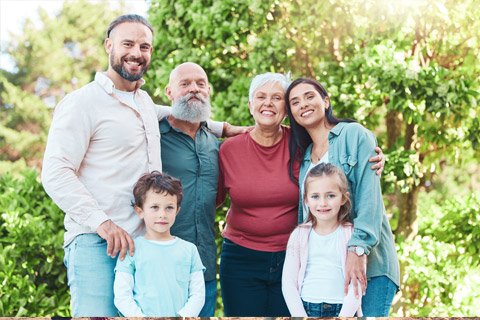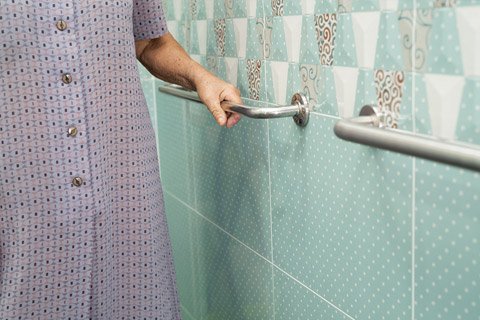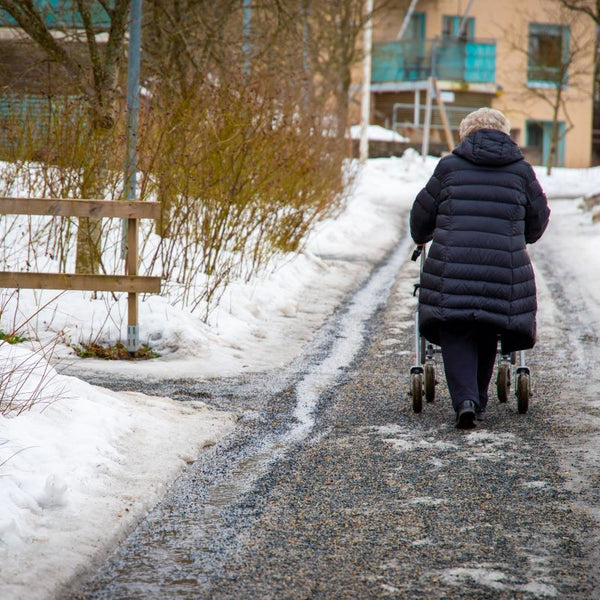As our parents age, many of us are facing a difficult decision of how to best support them in their later years. In some cases, moving elderly parents into your home might be one solution to make sure they are safe and have access to all the essential care.
While multigenerational living offers a whole range of benefits, allowing you to stay close to your parents and immediately respond to any emergency situation, it also requires careful planning and consideration.
In this article, we’ve prepared a detailed checklist for moving elderly parents into your home, covering all the essential information and areas to consider to help with a smoother transition and preparing a safe, supportive environment for your elderly loved ones.
Jump to:
- Is multigenerational living right for you?
- Benefits of moving your elderly parents into your home
- Checklist for moving your elderly parents into your home
- Challenges of multigenerational living
- Tips for creating a supporting environment
1. Is multigenerational living right for you?
The first thing to consider before moving your elderly parents into your home is the question whether multigenerational living is the right choice for you and your family. Therefore, the best way to start is to evaluate your living conditions and make sure you can accommodate the needs of your elderly parents.
The common factors to consider include:
Accessibility and space availability
Stairs, narrow doorways and other obstacles in your home can pose a significant challenge to the mobility and safe living of elderly people. Before making the decision, it’s important to address all these aspects and adjust your living spaces if needed.
Similarly, it’s important to consider whether you have adequate space to accommodate them in your home, making sure they can maintain a sense of privacy and independence. Taking into account the impact that moving elderly parents into the home will have on everyone who currently lives there is also essential.
As well as physical space, it can be beneficial to consider everyone’s mental wellbeing and the changes everyone in the household might need to make to help the new dynamics work.
Daily living in close proximity with older adults who have lived very independently for many years in their own household can be a challenge for everyone at times.
Care needs and health conditions
Additionally, can you provide your elderly parents with the care they require? It’s important to consider that serious health conditions or other needs might require more intense support, caregiving and medical supervision than you are able to provide.
It is also worth looking ahead to think about additional support or assistance that might be available if and when it is needed in the future, and how that could potentially work when your older loved one is living with you.
Time commitment
Living with elderly ones can require a time commitment and flexibility to provide hands-on care and supervision, when needed, making sure they have the support required for their safety and wellbeing. Therefore, it’s important to consider whether it’s possible to make changes to your current schedule and be flexible with your personal responsibilities to accommodate this.
Financial considerations
Finally, there are also financial implications when it comes to multigenerational living. From increased household costs to potential home modifications that could make life easier and safer for older adults, it’s important you’re aware of the financial changes that might happen before moving your elderly parents in. If anyone in the household currently claims certain benefits, eligibility can sometimes be affected by more adults moving into the property, so it’s also a good idea to check on whether this will impact household finances.

2. Benefits of moving your elderly parents into your home
On the other hand, living with your elderly loved ones can offer a number of benefits, including:
- Enhanced family bonds and a supportive environment
- Combatting isolation and loneliness of your elderly parents
- Better access to caregiving and supervision
- Cost-effective alternative to assisted living facilities
- Flexibility in caregiving arrangements
- Immediate response to emergencies
- Positive impact on elderly people’s mental health and wellbeing
3. Checklist for moving your elderly parents into your home
Once you’ve considered all the implications and benefits of moving your elderly parents into your home, you may find our checklist below useful for the transition process:
Consult with your parents
- While moving elderly parents into your home might feel like the best thing to do for you, it’s important to discuss your decision with them, addressing all your parents’ concerns and desires regarding the living arrangements.
Create a detailed plan
- Then, develop a comprehensive plan for moving timeline, home modifications and caregiving arrangements. Before moving your parents in, make sure your home is equipped with all the essential belongings, appropriate furniture and other things that will make your parents feel comfortable and welcome. Deciding what they will bring with them when moving into your home is an important part of this.
Divide responsibilities
- As part of the planning process, it’s important to think about effectively dividing any caregiving responsibilities between the rest of the family members, if applicable, and adjust your schedules according to the needs of the elderly ones.
Seek professional guidance
- If you’re unsure about what’s the best approach to take when living with your elderly parents, it’s always a good idea to connect with health professionals, social workers or geriatric specialists to get advice and discuss the next step.
- Similarly, if you feel like your schedule won’t allow you to provide consistent care to your parents, you can ask a professional carer to step in and help share the responsibilities.

Prepare your home
- To make sure you can offer a safe and welcoming environment to your elderly parents, you might need to make certain modifications to increase accessibility and comfort for elderly individuals with varying mobility and health needs. From installing grab bars and shower seats to using non-slip floor mats, all these adjustments can reduce the risk of falls and give your loved ones additional support during their daily routine.
- You can learn more about safety home adjustments from our article on popular independent living aids for seniors.
Secure healthcare
- Especially if moving your elderly parents to a different location, it’s essential to make sure their medical care remains consistent. Therefore, before making the move, research the local health services that will suit your parents’ needs and contact them in advance to schedule initial appointments and consultations.
4. Challenges of multigenerational living
While multigenerational living is a great way to support your elderly parents and provide them with all the necessary care they need, it can also pose a range of risks and challenges to you and your family members.
These are some of the most common challenges to prepare for when moving elderly parents into your home:
- Limited living space, which can lead to overcrowded rooms
- Lack of personal space and privacy
- Different lifestyle preferences and routines, that may lead to misunderstandings and conflict
- Balancing caregiving responsibilities with personal commitments
- Generational differences and communication issues
- Emotional and psychological challenges
While these challenges can come as a natural result of multigenerational living, they can usually be resolved by mutual respect and good communication. Therefore, before moving elderly parents into your home, it’s crucial to share clear expectations and establish a healthy routine that will benefit all sides.

5. Tips for creating a supportive environment
So, how to create a supportive environment for your elderly parents while not completely giving up on your current lifestyle choices and preferences? As already mentioned, good communication is the key to establishing clear boundaries and realistic expectations, allowing everyone in the household to maintain a sense of privacy and independence.
Here are some additional wellbeing tips to follow when living with your elderly loved ones:
- Delegate specific caregiving responsibilities to family members and care professionals to balance duties and avoid exhaustion
- Seek support from community resources, support groups, or elder care services if needed
- If possible, involve your elderly parents in activities that align with your lifestyle to create shared memories and step out from the stereotype
- Encourage your parents to independently engage in activities outside of home and make connections
- Effectively manage your time to stay organised and maintain a sense of control
- Allocate dedicated time for self-care, relaxation and activities outside of the caregiving responsibilities
- Explore therapy and counselling services to address emotional and psychological challenges that might occur
Overall, moving elderly parents into your home is an important life decision that might significantly affect your current day-to-day life. However, by careful planning and effective communication, you can create an inclusive environment for your elderly loved ones, supporting them in their later life and improving their overall wellbeing.
Support for older relatives
If you’re looking for additional support when living with elderly individuals and peace of mind when you’re out and about, you might also want to consider purchasing one of our personal alarms. With features like automatic fall detection or GPS tracking, our personal alarms allow an elderly person to quickly connect with assistance in a situation of emergency.






